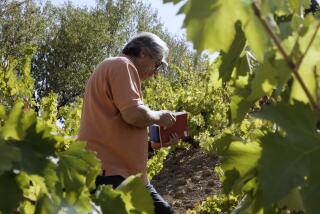Anti-Alcohol Drive Targets Home-Brew Rebellion : Kremlin Orders Eclipse of Moonshining
- Share via
MOSCOW — The Kremlin has ordered a major crackdown on the making of moonshine by Soviet citizens who have launched a home-brew rebellion against the anti-alcohol policies of Soviet leader Mikhail S. Gorbachev.
The sale of sugar, a key ingredient in what the Soviets call samogon, is rising so rapidly this year that Gorbachev himself has called it “a scandal.” Sugar rationing has started in some places, and the police have stepped up efforts to halt household distilling, even using dogs to sniff out illegal booze.
As an example of the intensity of the anti-alcohol drive, the weekly newspaper Ogonek on Monday disclosed the suicide last winter of a scientist, Yakov Goldoriga, who had made major advances in cultivating grapes for wine.
Destruction of Vineyards
According to the paper, overzealous authorities had denounced individuals producing high-quality wines, which in turn led to the destruction of a number of vineyards, and “the death of his (Goldoriga’s) business meant his death.”
Reporting on the drive against illegal booze, a local newspaper in Moscow reported that 1,505 cases of moonshine were uncovered during the last seven months and that 13,477 liters of homemade liquor were confiscated.
Soviet Russia, a leading national newspaper, said there is a “new wave” of illicit alcohol production that has caused a severe shortage of sugar in many parts of the Soviet Union.
Pravda, the main organ of the ruling Communist Party, printed a letter Monday saying that lines more than half a mile long have formed in one Ukrainian town to buy sugar.
Soviet sugar consumption in the first half of this year, Gorbachev disclosed, increased by an average of 14% over the same period in 1986. Some places recorded a 20% rise, he said.
“They are making hooch with it, that’s what they are doing with the sugar,” Gorbachev told a group of farmers near the town of Zavorovo. “This is a scandal. . . . It must be stopped.” His remarks, broadcast on the nightly television news, clearly reflected official impatience with the diversion of sugar for samogon.
“Sterner measures are now being taken against moonshiners, and, if necessary, even stricter measures will be taken,” Gorbachev promised. “They must be exposed at public meetings in the villages.”
Thousands of Lives Saved
Soviet officials have said that the two-year-old campaign against drunkenness, including higher prices for vodka and sharply reduced selling hours at liquor stores, has saved hundreds of thousands of lives and promoted more healthy family life.
Signs of resentment against the anti-alcohol campaign, however, were reported recently in the Far East region of Khabarovsk.
The Soviet Russia newspaper strongly criticized the leaders of Vyazemsky district for banning the sale of liquor in a “sobriety zone” without preparing the residents for such a step.
The newspaper said that voters in the district used a recent experimental multi-candidate election to vote against many of the leaders who created the “sobriety zone.”
More to Read
Sign up for Essential California
The most important California stories and recommendations in your inbox every morning.
You may occasionally receive promotional content from the Los Angeles Times.










